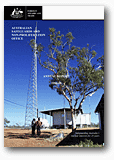


Annual Report 1998-99 |
 |
OUTLOOK: THE YEAR AHEAD
he outlook on issues relating to weapons of mass destruction is less certain now than in the mid-1990s, and the non-proliferation terrain is more difficult. Nuclear testing in South Asia, with continuing outbreaks of hostilities there, plus continuing concerns about the security of nuclear weapons and fissile material in Russia, cast a shadow into the coming year. Concluding a BWC verification and kick-starting the FMCT negotiations will be challenging. Furthermore, it cannot be taken for granted that the NPT Review Conference in 2000 will have an unequivocally positive outcome.
Generally, States have been slow to conclude Safeguards Protocols, and the earlier expectation that the Protocol would be the safeguards norm by the next NPT Review Conference (April 2000) is now unlikely. As at 30 June 1999, there were still only five Protocols in effect, though a further 36 Protocols had been signed or approved by the IAEA Board of Governors, and ratification of these can be expected during the year as the necessary legislation is put in place. However, this leaves some 30 non-nuclear-weapon States party to the NPT that have nuclear activities but have made no commitment to conclude Protocols. A major priority for 1999-2000 will be continuing encouragement for other States to conclude their Protocols as quickly as possible, so that strengthened safeguards measures can be brought into general application without delay.
Notwithstanding difficulties in the CD, ASNO will continue to promote the FMCT, under which the production of fissile material for nuclear weapons would be prohibited. ASNO is closely involved with DFAT, the IAEA and counterpart organisations in developing FMCT concepts and strategies. The FMCT will be complementary to the CTBT—together they would place a quantitative cap on the amount of nuclear material available for weapons and a qualitative cap on nuclear weapon development.
As a major contribution to safeguards implementation in the Asian region, ASNO will be conducting, on behalf of the IAEA, a regional training course for national safeguards personnel. This course is being funded by AusAID.
Work on the operation of Australia’s bilateral safeguards agreements is ongoing. In the coming year ASNO will participate in nuclear policy discussions with Japan, the ROK and Euratom. Also there will be technical discussions with ASNO’s counterparts on holdings of AONM and on international safeguards issues.
As Australia’s national authority for the CWC, ASNO will collect national information for, and make declarations to, the OPCW, while enabling any OPCW inspections of relevant facilities in Australia. Similarly, we will strive to strengthen the CWC verification regime by, inter alia, helping to resolve outstanding technical implementation issues. As part of our regional outreach work, ASNO has been invited to assist Vietnam and Indonesia to establish their National Authorities and to train staff.
Pending the conclusion of negotiations for the BWC verification protocol (with its attendant national responsibilities and obligations) and formal establishment of a BW national authority, ASNO will provide technical support to DFAT for the negotiations which are expected to increase pace sharply in the coming year.
ASNO will work to ensure that Australia’s CTBT obligations are met, primarily by coordinating the establishment and operation of Australian stations in the Treaty’s International Monitoring System.